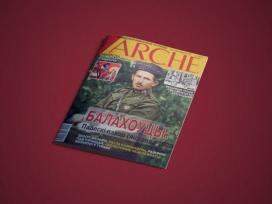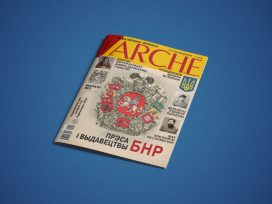How to have become a nationalist
From hard-line Soviet to touchy-feely populist, Belarusian president Lukashenko has ploughed an erratic political course. It is easy to mock his pledge to provide modeling jobs for beautiful local girls, or to ensure that all Belarusian children are looked after at home – standard fare that appeals to his supporters, the “simple people” as he put it. But if Russian subsidies continue to fall, his nationalism might turn out to be genuine.
Any speech made by Belarusian president Lukashenko entitled “The course of the State has not changed” can be taken as a signal that it has. For several years now, Lukashenko has been developing what might be termed a Sinn F�in, or “ourselves alone” policy. As he said in the speech made after the national referendum in October 2004, “the whole ‘Machine’ falls upon us – both in the West and – among some political circles, who hide their sins, in brotherly Russia.” Although Belarus, in Lukashenko’s view of the world, is attacked from all sides, it is not because it is really an enemy of democracy, but because it is an island of stability and a rebuke to the hyper-liberal New World Order.
The West forsook him a long time ago, but problems with Russia have also been developing since 2000. First, Lukashenko does not serve the interests of the Putin Kremlin as well as he did in the Yeltsin era. Putin’s less ideological, more toughly pragmatic foreign policy has less need for the symbolism of the “Union” process, and rather more for the hard economics of oil and gas. Russia no longer needs a licensed foreign policy “outrider” advocating the kind of tough line on Serbia, Iraq, and so on that was difficult for Russia itself to flaunt in front of the West. Furthermore, given Russia’s main foreign policy gain since September 11, and Washington’s acceptance of its complex struggles on its southern frontier as part of the “war on terrorism”, the Kremlin dose not consort so readily with rogue states as it once did. Lukashenko also represented certain aspects of the Old Family’s business interests. The newer clans around the Kremlin expected an opening up for Russian capital to Belarusian markets after Lukashenko’s re-election in 2001, but that did not happen.
Lukashenko’s inward turn has already been manifested symbolically. His personal website, particularly the section on national history,1 has become interestingly eclectic – certainly a long way from Lukashenko’s normal position that Belarusian history was largely terra incognita before the establishment of the BSSR in January 1919. Other “court intellectuals” have reworked their mixture of Soviet nostalgia and West-Rusism more to resemble a mixture of the latter with some judicious borrowings from the “national” tradition: a poet here, a writer there. The section on Lukashenko’s website concerning cultural heroes2 tries to incorporate almost every famous Belarusian, including even the Uniate Metropolitan Yazep Rutski. Lukashenko’s political language has also changed dramatically in recent years. His equation in February 2004 of Russia’s mid-winter reduction of gas supplies with “terrorism” would have been unthinkable four years ago.3
Lukashenko’s decision to rush through the referendum on 17 October was therefore a gamble that Russia was looking the other way after Beslan. But what does Lukashenko’s speech imply about his new course either side of an expected re-election campaign in 2006? It is easy to mock Lukashenko’s pledge to provide modeling jobs for beautiful local girls, or to ensure that all Belarusian children are looked after at home. Most of his speech offered fairly standard populist fare, which is neither unusual nor necessarily ineffective. As he put it himself: “My supporters are simple people.” Hence his plentiful promises to maintain socially responsible “industrial giants”, prevent “discrimination” against domestic producers or workers, and the like.
However, it is significant that Lukashenko has begun to place more stress on more general public goods that authoritarian states claim to provide. In his earlier September speech4 announcing the referendum, Lukashenko put it bluntly: “May God protect us – over these ten years no Belarusian has become a victim of a terrorist act, or an armed conflict. We have guarded our country against involvement in international adventures which could threaten your lives and security even to the smallest degree. This is our greatest achievement.” Belarus remains a “tranquil and cosy home, where peace and harmony reign.” This is a negative achievement, but still one that is important to many Belarusians.
Also interesting were some of his more detailed promises. Again, these should not be mocked. The second terms of Bill Clinton (1997-2001) and Tony Blair (2001-2005) were both notable for downplaying the politics of ideological drama and grand narrative in favour of a micro, even microscopic, policy of “small things”. Lukashenko therefore promised action against “churlish shop assistants”, the provision of rural homes for US$ 18 000, cheap credit, and free legal advice. If properly marketed, and there is no reason to suppose such initiatives will not be roundly praised in the state media, even such small policies can be sold as evidence of the benefits a “non-ideological” approach can bring.
Lukashenko’s speech was also notable for its musings about national character. He clearly considers that economic nationalism is not incompatible with his traditional rhetoric about “Soviet Slavic civilization”. But the strangest part of his speech must be his reflection that people are no longer growing up with Soviet values. His warnings about long-term demographic trends were also a tacit admission that his paternalistic policies cannot indefinitely isolate the country from the social problems facing Russia and Ukraine – even if population figures are not yet falling as drastically nor public health systems yet in such a catastrophic state of disrepair.
Lukashenko also attacked “book” economists, who would of course argue that his economic policies will ultimately strangle industrial competitiveness, and that their sheer cost will win out in the end. Largely unconvincingly, of course. Lukanomics is of course predicated on the trump card Lukashenko has been able to play since 1994. As of 2000, Russian subsidies, direct and indirect (debt pardons and reschedules, customs concessions, heavily subsidized energy imports, assistance to the Belarusian currency) provided Belarus with at least US$ 1.2 billion annually, or 10 per cent of local GDP.5 If estimates of US$ 3 billion are nearer the mark, the figure rises to almost 30 per cent of GDP. The lower figure is more in tune with present realities, and can only be expected to fall still further. The “Belarusian model” is only sustainable if the rundown of Russian subsidies is gradual. On the other hand, economic leverage is important to the Kremlin, as it cannot use its favourite “political technology” methods in a relative autocracy like Belarus, especially after they have just failed in Ukraine.
Lukashenko is of course relieved that he secured his referendum victory before the current upheaval in Ukraine, rather than after. He will no doubt assume that he can contain any copycat protests for now, but Belarus is still within the contagion zone. Belgrade in 2000, Tbilisi in 2003, and now Kiev in 2004 were revolts not against autocracy, but against pseudo-democracy. Leaders like Karimov and Turkmenbashi are safe, those who still pay lip service to democracy, like Lukashenko, are not.
If Belarus is to become even more isolated in the next few years, as Lukashenko seeks to fight off Russian influence, he seems to be gambling that his economic policies will rally support. However, for all of his talk of building a “strong and enlightened Belarus”, “with all the attributes of statehood”, his first-term policies (1994-2001) mean that he has not prepared the ground for a Listian programme of national sacrifice.6 That is, he cannot appeal for the population to endure temporary hardship in the name of a nation he has so often treated as hyphenated; Soviet-Belarusian, Slavic-Belarusian or Orthodox-Belarusian rather then plain (BNF) Belarusian. If his overall policies are to make sense, he might end up a real nationalist after all.
IMF, Republic of Belarus: Selected Issues, Country Report no. 02/22 (Washington, DC: 2002), pp. 5 and 39.
Friedrich List (1789-1846), an advocate of the general economic good; both in terms of state intervention for collective benefits, and across generations, of short-term sacrifice for long-term gain.
Published 28 September 2005
Original in English
First published by Arche 1/2005
Contributed by Arche © Andrew Wilson/Arche Eurozine
PDF/PRINTNewsletter
Subscribe to know what’s worth thinking about.



